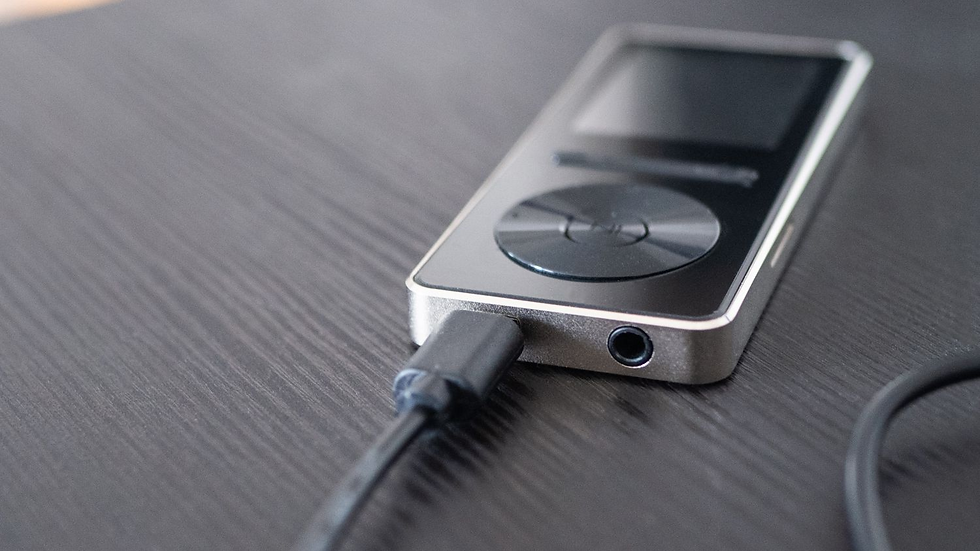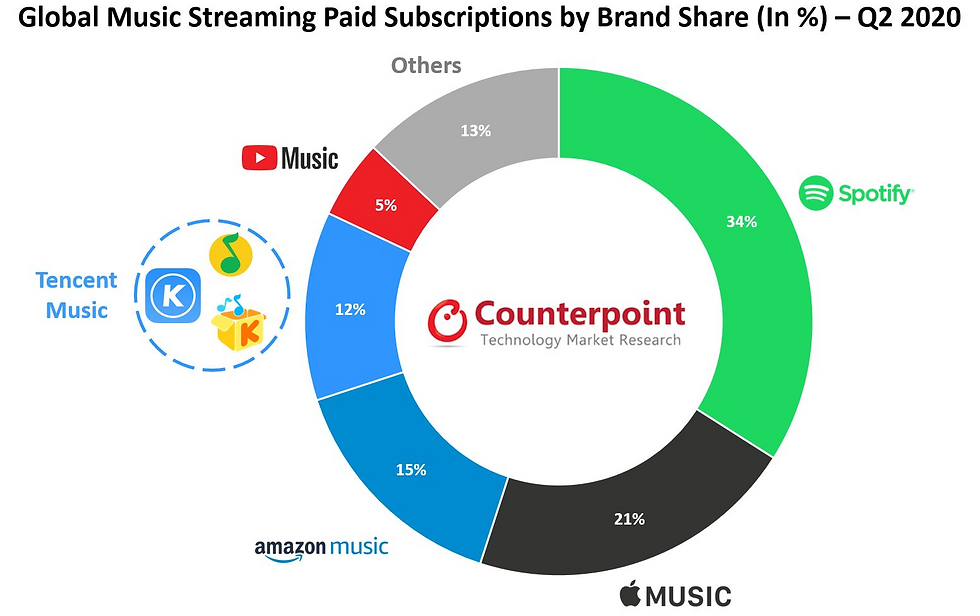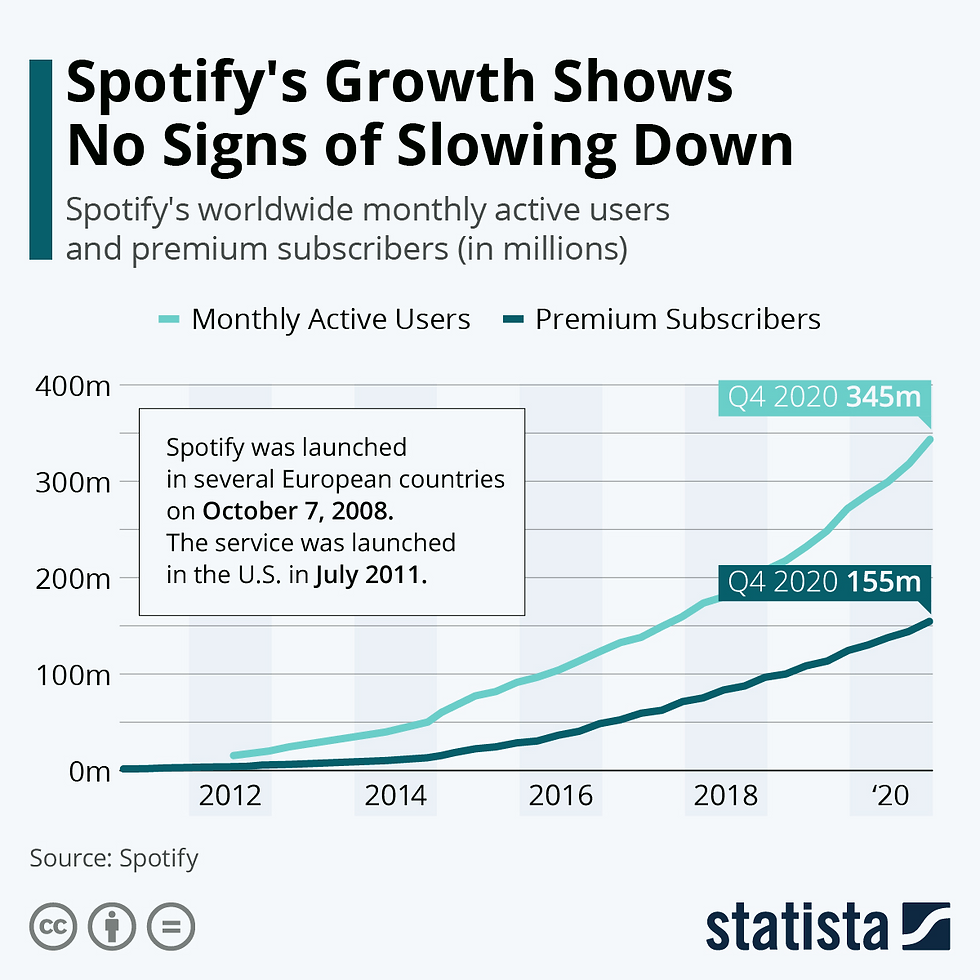Why Spotify's Best Days Are Yet To Come
- Rohan Nidmarti
- Jun 18, 2021
- 4 min read
4 out of every 10 people listen to music on one particular streaming service. It doesn't take a genius to understand which one I'm talking about. Spotify is one of the most recognisable brands in the world today. It has a market cap of $48 billion, however, it is a highly under-appreciated company. To understand what led to Spotify's exponential growth, we need to take a look at history.

MP3 to Spotify:
Before the iPod, there was the creation of the MP3. Although the rise & fall of the MP3 took place before my birth, I've heard people referring to it as the factor that led to the growth of digital transfer & consumption of music. MP3 is the means of compressing a sound sequence into a very small file to enable digital storage & transmission.

In 1999, Sean Parker sensed an opportunity, and invented the infamous Napster. It was a simple, free peer-to-peer (P2P) file-sharing service. Not only did this disrupt the music industry by making songs that previously required payment to acquire, freely accessible, it also demonstrated the power of P2P networks. Napster also led to the growth of music piracy. In 2001, the 3 major record labels filed lawsuits against Napster, as the service was leading to their revenue loss. Major artists such as Dr. Dre, Metallica, & Eminem also filed lawsuits. Napster was distributing copyrighted material without authority, and this led to its fall in 2002.
Apple launched the iPod in October 2001. Steve Jobs found portable MP3 players big & clunky, with awful user interfaces. He wanted to develop a better MP3 player along with a music store, iTunes, to complement it. The store became the market leader after its launch. Apple was also successful at keeping record labels happy, because it charged $0.99 per song instead of giving it free like Napster, however, Apple made very little profit on the sale of each song. The iPod also decreased the accessibility of music since it costed $399. To have 1000 songs in your playlist (something which is very common today), would cost $1400 in 2003.
The Birth of Spotify:
In 2006, Spotify was launched in Sweden by Daniel Ek, who realised that Apple's strategy with the iPod & iTunes is like that of a cinema where people buy tickets to see one movie. He wanted to launch a Netflix-like model for music where people can pay monthly fees to access the music. Spotify is a freemium platform, where free users are monetised through ads, and paid users are monetised through premium subscriptions.

Spotify fundamentally improved on the Napster experience in every single way. It delivered music instantly, with high-quality audio, and completely legally. The broader music industry was in decline, and Spotify's timing was perfect. Global music industry revenues in 2008 had fallen to $16.9 billion from a high of $25 billion in 1999. The Big 4 record labels agreed to make their entire back catalogs available to Spotify.

By 2011, Spotify had become a dominant player in Europe and decided to launch in America. One of the company's biggest challenges during this time was bridging the gap between free & paid users. Undoubtedly, Spotify's biggest advantage is its vast data. By 2015, it starting developing curated playlists and recommendations. It also developed social features, where users can follow their friends & like their playlists, and also see what their friends are listening to.
At its core, Spotify is a tech company. It's engineering team has created features such as Discovery Weekly, Release Radar etc. In 2018, it went public and the company was received very well. Today, Spotify has 356 million users (158 million paid), and a 40% market share in the music streaming industry.

Drawbacks:
The business of music has always been tough. 3 record labels- Universal Music Group, Sony Music Entertainment, & Warner Music Group- control 90% of the music industry. Spotify does not produce music of its own, and is constantly negotiating with the Big 3, who squeeze margins and financial upsides from listener growth. Even if one of these labels decide to withdraw their libraries from Spotify, it would cause a billion dollar damage to Spotify.
Ancillary Products:
Keeping the drawbacks in mind, we now come to Spotify's next business strategy: Podcasts. Spotify is spending large amounts of money to acquire podcasts. It bought Joe Rogan's series for $100 million, Bill Simmon's for $200 million, & is producing Michelle Obama's & Kim Kardashian's podcasts. It also owns the entire podcast supply chain. It bought podcast operating system, Anchor for $150 million, podcast advertising company Megaphone for $235 million, & podcast producer Gimlet for $195 million.
Not only are podcasts growing in popularity, they're only now starting to be monetised. Podcasting is done by everyone, from celebrities to students. Spotify hasn't yet capitalised on its vast podcast library, and is waiting for more users to join. Once it becomes the dominant force in podcasting, it will connect listeners, such as us, to advertisers. I assume, Spotify will also establish a YouTube-like Partner Program, where it'll share ad-revenue with the podcaster, thus incentivising more users to upload. I wouldn't be surprised if 'podcaster' becomes a viable profession in the future, just like YouTuber.

Hence, Spotify has a two-pronged business model:
1) The music freemium platform.
2) The podcast play.
Spotify in the future can also establish a premium platform for podcasts. It can rope in celebrities, YouTubers, & athletes to create podcasts of their own, which would only be uploaded on the premium platform. The popularity of such celebrities, and the urge to listen to them would automatically drive users to the premium version.
Conclusion:
Spotify is still very early in it's podcast strategy, & will need to invest billions of dollars more into it. Till then it has it's music business which is growing, and recorded $9.2 billion in revenues in 2020.
Spotify is still scratching the surface when it comes to podcasts, however, it now owns the entire supply chain. Spotify has made it big by bettering products that already existed. It developed a better platform compared to Napster or iTunes, and did the same with podcasts (Apple was the first major player in podcasts). Spotify's best days are yet to come.

Thankyou for reading! Please do subscribe



Comments